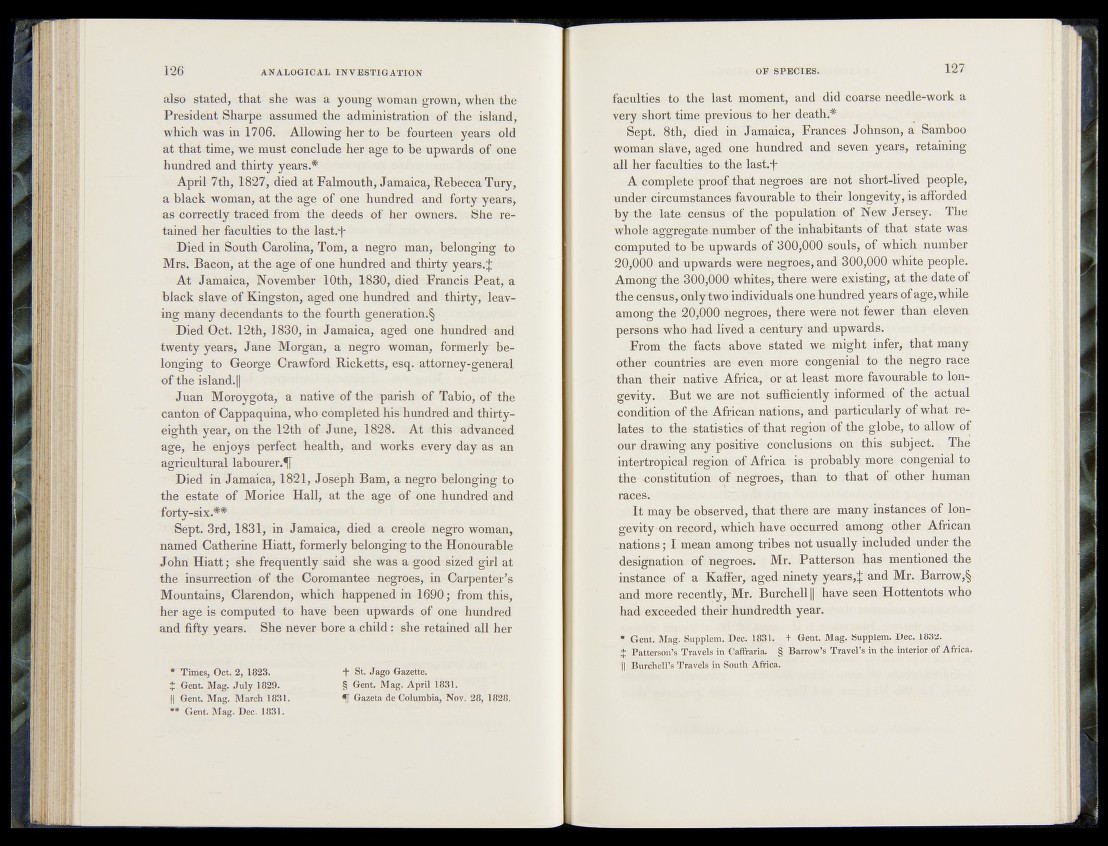
also stated, that she was a young woman grown, when the
President Sharpe assumed the administration of the island,
which was in 1706. Allowing her to be fourteen years old
at that time, we must conclude her age to be upwards of one
hundred and thirty years.* *•
April 7th, 1827, died at Falmouth, Jamaica, Rebecca Tury,
a black woman, at the age of one hundred and forty years,
as correctly traced, from the deeds of her owners. She retained
her faculties to the last.'f
Died in South Carolina, Tom, a negro man, belonging to
Mrs. Bacon, at the age of one hundred and thirty years.J
At Jamaica, November 10th, 1830, died Francis Peat, a
black slave of Kingston, aged one hundred and thirty, leaving
many decendants to the fourth generation^
Died Oct. 12th, 1830, in Jamaica, aged one hundred _and
twenty years, Jane Morgan, a negro woman, formerly belonging
to George Crawford Ricketts, esq. attorney-general
of the island.J| 1
Juan Moroygota, a native of the parish of Tabio, of the
canton of Cappaquina, who completed his hundred and thirty-
eighth year, on the 12th of June, 1828. At this advanced
age, he enjoys perfect health, and works every day as an
agricultural labourer.^!
Died in Jamaica, 1821 J o s e p h Bam, a negro belonging to
the estate of Morice Hall, at the age of one hundred and
forty-six.##
Sept. 3rd, 1831, in Jamaica, died a creole negro wontan,
named Catherine Hiatt, formerly belonging to the Honourable
John Hiatt; she frequently said she was a good sized girl at
the insurrection o f the Coromantee negroes, in Carpenter’s
Mountains, Clarendon, which happened in 1600; from this,
her age is computed to have been upwards of one hundred
and fifty years. She never bore a child: she retained all her
* Times, Oct. 2, 1823. + St. Jago Gazette.
$ Gent. Mag. July 1829. § Gent. Mag. April 1831.
Jj Gent. Mag. March 1831. % Gazeta.de Columbia, Nov. 23, 1828.
*• Gent. Mag. Dec. 1831.
faculties to the last moment, and did coarse needle-work a
very short time previous" to her death.* •
Sept. 8th$ died' in “Jamaica, Frances Johnson, a Samboo
woman slavoyaged one hundred and seven years, retaining
all her faculties to the last.-f
A complete proof that negroes are not short-lived people*
under circumstances favourable to their longevity, is afforded
by the late census of the population of New Jersey. The
whole aggregate .number of tthe inhabitants of that state was
computed to be upwards of 300,00Q souls, of which number
20,000 and upwards were negroes, and 300$00. white people.
Among the 300,000 whites, there were existing, a t the date of
the census, only two individuals* dnehundred years of age, while
among the 20,000 negroes, there were not fewer fhan eleven
persons who had lived a century and upwards. • i
From the facts' above stated we might infer, th atjnany
other countries are even more congenial to the negro race
than their native Africa, or a t least more favourable, to longevity.
But we are not sufficiently informed of the a'ctual
condition of the African nations, and particularly of what relates
to the statistics of that region of the globe, to allow of
our drawing any positive conclusions on this subject.., The
intertropical region of Africa is probably, more congenial to
the constitution of negroes, than to that of other human
races.
It may be observed, that there are many instances of longevity
on record, which have occurred among other African
nations; I mean among tribes not usually included under the
designation of negroes. Mr. Patterson has mentioned the
instance of a Kaffer, aged ninety years,$ and Mr. Barrow,§
and more recently, Mr. Burchell|| have seen Hottentots who
had exceeded their hundredth year.
• Gent. Mag. Supplem. Dec. .1831^+ Gent. Mag. S^ppl^m. Item 1832.
$ Patterson’s Travels hi Caffraria. § Barrow’s Travel’s in the interior of Africa.
J ig Burchell’s Travels in South Africa.